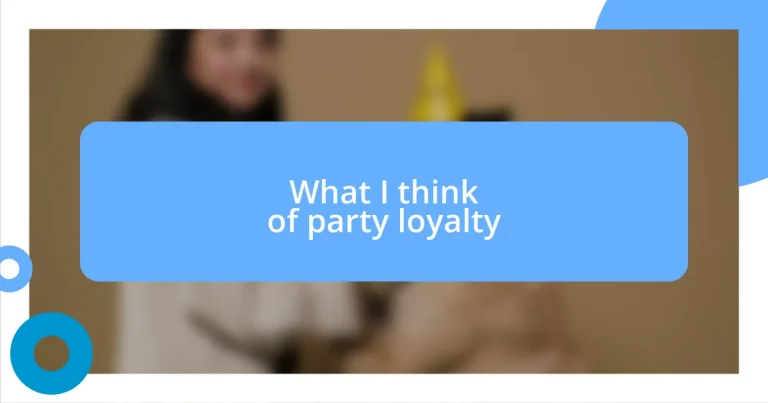Key takeaways:
- Party loyalty can lead to cognitive dissonance and polarization, with individuals often prioritizing group identity over personal beliefs, which may stifle critical thought and open discourse.
- Factors influencing party loyalty include social identity, leadership charisma, and formative personal experiences that create deep-rooted allegiances.
- Redefining loyalty involves engaging with diverse perspectives and prioritizing meaningful dialogue over blind allegiance, fostering a more inclusive and understanding political environment.
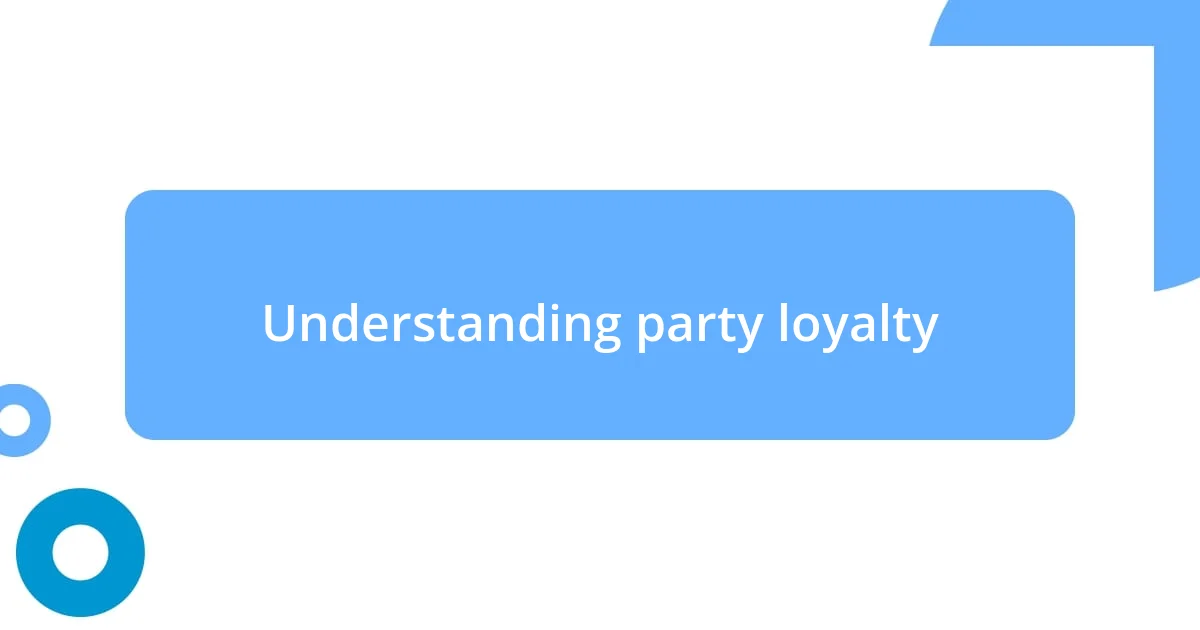
Understanding party loyalty
Party loyalty can often feel like a double-edged sword. I remember when I first engaged in politics; it was thrilling to belong to a group with shared ideals. However, I soon noticed that some members were more loyal to the party’s identity than to the principles it professed. Isn’t it puzzling how a label can sometimes eclipse our moral compass?
At times, I find myself wondering what drives this fierce dedication. Is it the desire for community and belonging? For many people, political affiliation becomes part of their identity, blending seamlessly with friendships and family ties. I’ve experienced those moments when a casual dinner conversation mellows into heated debates, highlighting how intertwined our personal lives can become with our political stands.
Moreover, I’ve seen how party loyalty can lead to cognitive dissonance, where individuals ignore conflicting evidence just to stay aligned with their group. It’s a fascinating, albeit troubling, phenomenon. Have you ever challenged a political belief only to feel the weight of disapproval from your peers? I can relate; it can be daunting to stray from the accepted narrative, even when you know in your heart that questioning is vital for growth.
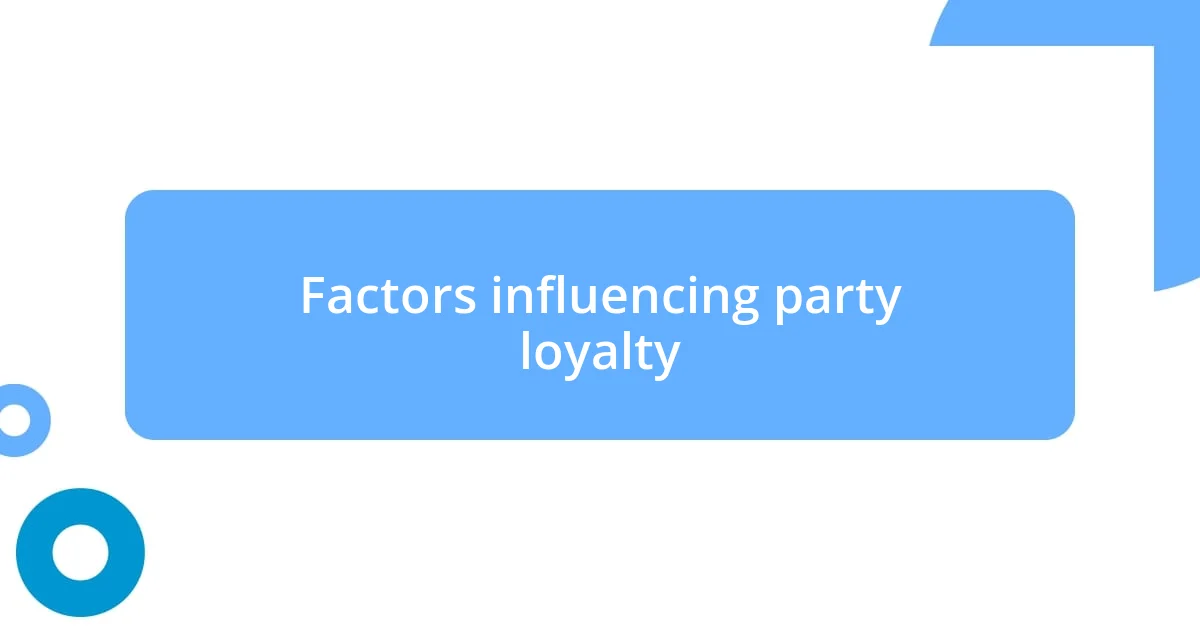
Factors influencing party loyalty
When considering the factors that influence party loyalty, one cannot overlook the significant role of social identity. I recall a time in college when my friends and I wore our political affiliations like badges of honor. This sense of belonging was intoxicating, and it created a bond that was hard to break. I believe this collective identity offers individuals a safety net, making them more inclined to stand by their party, even when faced with conflicting opinions or challenges.
Another important factor is the influence of leadership within a party. I’ve observed charismatic leaders who can sway public perception and rally supporters, often turning personal admiration into unwavering loyalty. This happened during a local election cycle when a candidate’s compelling speeches ignited enthusiasm and a strong attachment to the party among voters. It made me reflect—how much does the persona of a leader shape our commitment to a party’s cause?
Additionally, past experiences and historical context heavily weigh on party allegiance. Many people, myself included, find that formative experiences—like witnessing a family member’s struggles influenced by policy decisions—can anchor their political choices for years. Such personal narratives weave together with broader societal shifts, creating a tapestry of loyalty that can be both powerful and fragile.
| Factor | Description |
|---|---|
| Social Identity | Belonging to a group can create a strong sense of loyalty, as individuals often prioritize group affiliation over personal beliefs. |
| Leadership Influence | Charismatic leaders can inspire loyalty through their vision and personality, turning admiration into unwavering support. |
| Personal Experiences | Formative experiences and historical context shape perceptions, leading to deep-rooted party allegiance. |
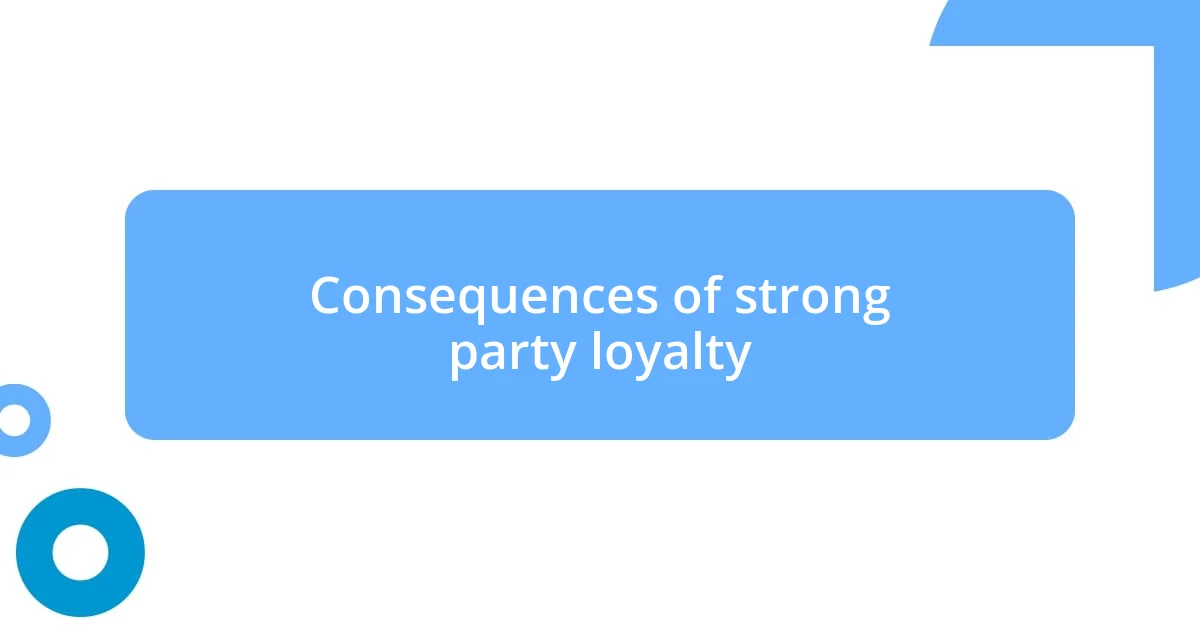
Consequences of strong party loyalty
One of the most striking consequences of strong party loyalty is the development of a polarized mindset. I remember attending a political rally where supporters ardently cheered, creating a palpable energy. However, it was disheartening to witness how quickly they dismissed opposing viewpoints. The echo chamber phenomenon thrives in this environment, where complex issues get simplified into a binary lens—us versus them. This rigid thinking can stifle meaningful conversations and reinforce divisions within society.
Strong party loyalty can also impact decision-making, often steering individuals away from critical thought. Here are some poignant consequences I’ve noticed:
– Polarization: Loyalty often leads to an ‘us versus them’ mentality, creating significant divides among political groups.
– Ignoring Evidence: Individuals may ignore factual information if it contradicts their party’s narrative, leading to a lack of informed discussions.
– Social Backlash: Challenging the party line can result in social isolation or backlash, pressuring individuals to conform rather than explore diverse perspectives.
– Loss of Nuance: Issues become oversimplified, with complex topics boiled down to party slogans, leading to misunderstandings and miscommunications.
– Emotional Attachment: Loyalty can foster an emotional bond that clouds judgment, where the party identity overshadows personal beliefs and values.
Through these experiences, I’ve realized that while connection to a party can bring a sense of community, it can also inhibit open-mindedness and critical engagement. Understanding these dynamics is crucial for anyone wishing to navigate the political landscape thoughtfully.
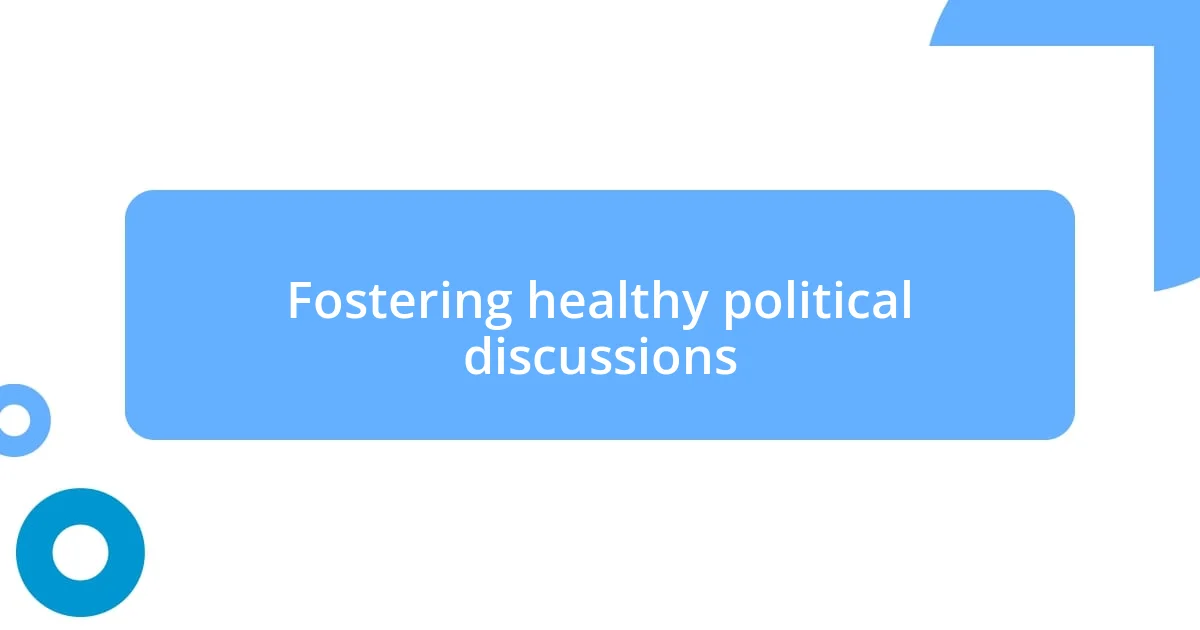
Fostering healthy political discussions
Fostering healthy political discussions requires creating an environment where diverse opinions are not just tolerated but welcomed. In one of my recent discussions with friends, I noticed that when we approached political topics with curiosity rather than defensiveness, the conversation blossomed into a rich tapestry of ideas. How often do we limit ourselves by simply sticking to our political bubble? Taking the time to truly listen and understand different perspectives made us feel more connected, rather than divided.
Engaging in political conversations is more effective when we prioritize respect and empathy. I remember a dinner party where a spirited debate unfolded, and instead of dismissing each other, we shared personal stories related to our viewpoints. It was fascinating to see how our experiences shaped our beliefs. Isn’t it amazing how one story can bridge the gap between seemingly opposing viewpoints? When we ground our discussions in personal narratives, we not only foster compassion but also invite deeper understanding.
Finally, utilizing questions can be a powerful tool in promoting healthy dialogue. I often ask open-ended questions like, “What factors influenced your views?” or “How did you arrive at that conclusion?” During a neighborhood meeting, this approach led to a deeper exploration of our community’s challenges and potential solutions. By encouraging others to share their thoughts, we create an inclusive space that values diverse perspectives. Isn’t fostering such an environment essential for progress? Engaging in conversations like this sharpens our critical thinking and enriches our collective knowledge.
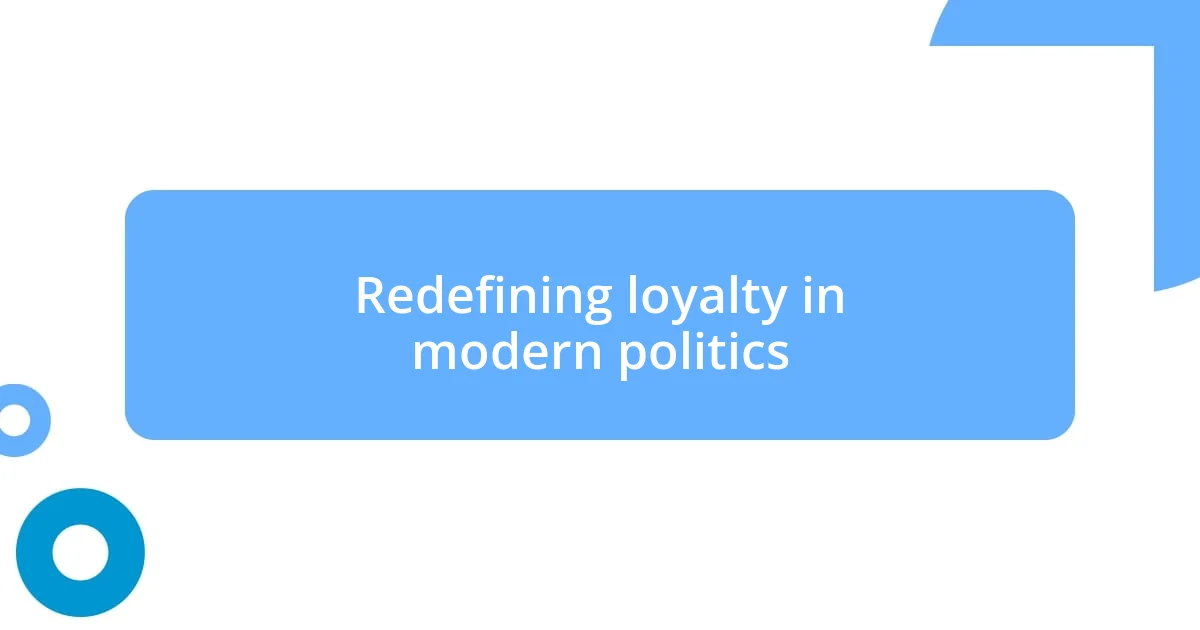
Redefining loyalty in modern politics
Redefining loyalty in modern politics is vital, especially as we witness shifting allegiances and evolving ideologies. I remember a time when I felt a strong affiliation to a particular party; it felt like a badge of honor. However, as I began to explore various viewpoints, I realized loyalty could mean much more than just unwavering support. It’s about engaging in a dialogue and understanding the larger picture, not just playing defense for a party line.
I’ve observed that many individuals, even those who once felt aligned with a party’s agenda, now find themselves questioning their loyalty. For example, during a recent community forum, several attendees expressed frustration over how their party addressed key issues that mattered to them personally. Isn’t it fascinating how this self-reflection can spark a deeper sense of responsibility? I found it encouraging to see people advocating for principles over party affiliation, embracing a more nuanced approach to political engagement.
This shift toward redefining loyalty opens the door to a more inclusive political landscape. By recognizing that loyalty doesn’t have to be blind, we can engage in conversations that matter. I often ask myself, “What do I truly believe in?” Instead of answering immediately, I take some time to reflect and seek out diverse opinions. This practice has taught me the importance of being adaptable and remaining open to change. After all, isn’t the ultimate goal to create a political environment that fosters understanding and collaboration rather than division?












